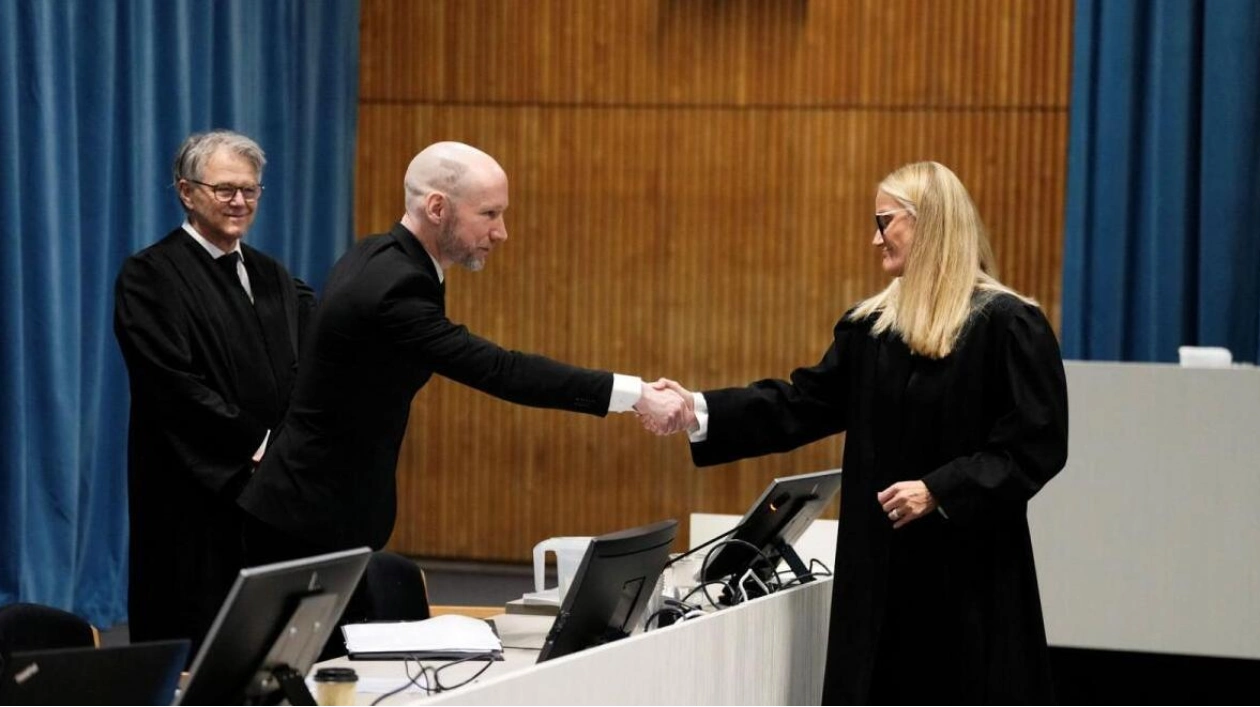Mass shooter Anders Behring Breivik shook hands with prosecutor Hulda Karlsdottir next to defense lawyer Oystein Storrvik on the first day of the Ringerike, Asker, and Baerum district court's hearing of his parole petition at Ringerike prison in Tyristrand, Norway, on Tuesday. REUTERS
Anders Behring Breivik, the Norwegian mass murderer responsible for the country's deadliest peacetime attack, should not be released and remains a significant threat, according to a prosecutor. Breivik appeared in court on Tuesday seeking release after serving over 13 years of his sentence. The neo-Nazi perpetrator killed 77 people in July 2011, including eight in a car bomb attack in Oslo and 69, mostly teenagers, at a Labour Party youth camp on Utoeya island. This marks Breivik's second attempt at parole. He is serving a 21-year sentence, the maximum penalty at the time of his crimes, which can be extended indefinitely as long as he is considered a danger to society.
Prosecutor Hulda Karlsdottir argued against his release, stating, "Is there a danger Breivik will commit crimes against life and health again? The danger is real," citing a recent risk assessment report that concluded the risk of Breivik being violent again remains unchanged. Breivik, 45, sat impassively in a dark suit, white shirt, and brown tie, with the right side of his head shaved to form the letter 'Z'. The significance of this symbol remains unclear, though the letter 'Z' has been used as a symbol of support for Russia's war in Ukraine.
The parole hearing is taking place at the high-security prison where Breivik is held, located on the shore of Tyrifjorden lake, near Utoeya. The court is set up in the prison's gymnasium, with Breivik scheduled to testify at 1300 CET (1200 GMT). Merete Stamneshagen, whose 18-year-old daughter Silje was murdered by Breivik at Utoeya, expressed the difficulty of Breivik's parole attempt for the victims' relatives, marking the sixth time Breivik has appeared in court. "This brings us right back to 2011," she said, viewing the proceedings from a court room in Sandvika, a suburb of Oslo, where the hearing was broadcast.
Local media at the prison reported that Breivik had written a political message on an A4 sheet of paper when entering the court, though the content was not disclosed. When asked if he regretted his crimes, Breivik declined to answer. His first parole attempt in 2022 was unsuccessful, with Breivik arguing then that he had renounced violence but not his neo-Nazi beliefs, stating he would continue to advocate for white supremacy through peaceful means. Additionally, Breivik has attempted to sue the Norwegian state to improve his prison conditions, claiming that solitary confinement violates his human rights. His latest attempt to alter his detention terms, made in January, was rejected, with his appeal set to be heard in December.
Source link: https://www.khaleejtimes.com






